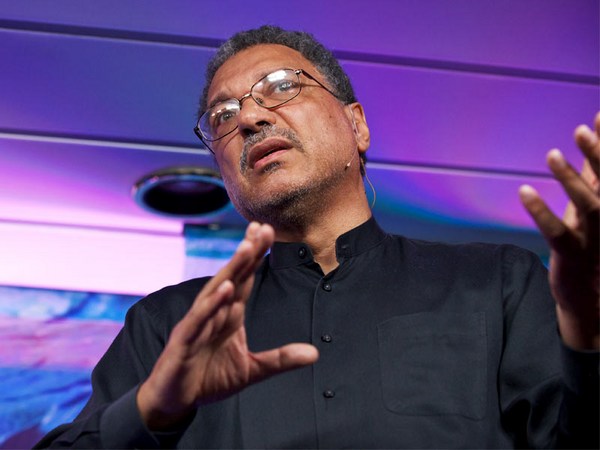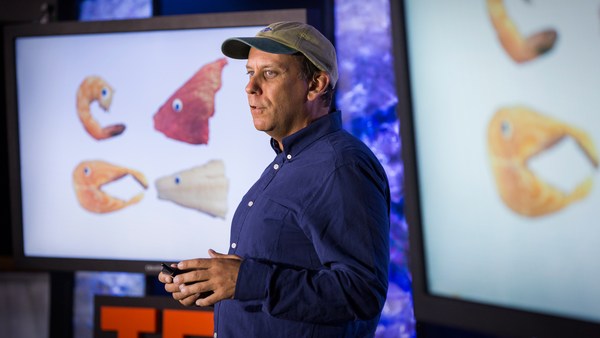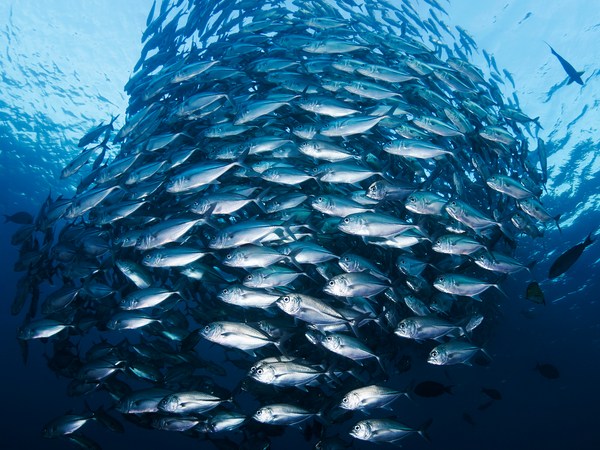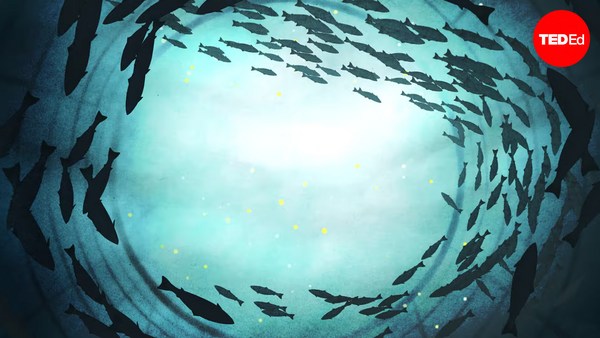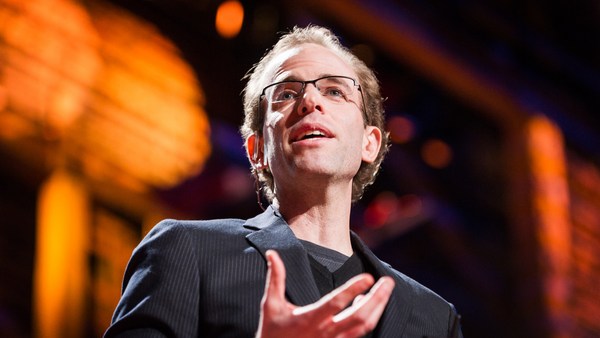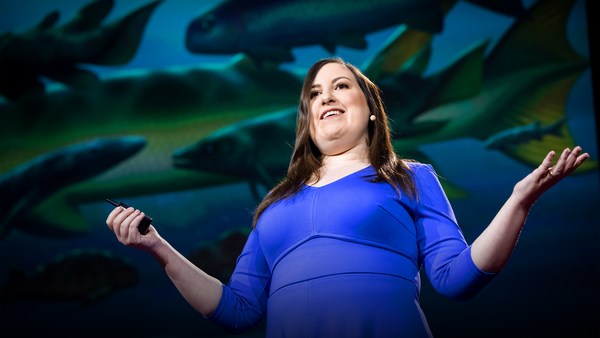So I come from the tallest people on the planet -- the Dutch. It hasn't always been this way. In fact, all across the globe, people have been gaining height. In the last 150 years, in developed countries, on average, we have gotten 10 centimeters taller. And scientists have a lot of theories about why this is, but almost all of them involve nutrition, namely the increase of dairy and meat.
In the last 50 years, global meat consumption has more than quadrupled, from 71 million tons to 310 million tons. Something similar has been going on with milk and eggs. In every society where incomes have risen, so has protein consumption. And we know that globally, we are getting richer. And as the middle class is on the rise, so is our global population, from 7 billion of us today to 9.7 billion by 2050, which means that by 2050, we are going to need at least 70 percent more protein than what is available to humankind today. And the latest prediction of the UN puts that population number, by the end of this century, at 11 billion, which means that we are going to need a lot more protein.
This challenge is staggering -- so much so, that recently, a team at Anglia Ruskin Global Sustainability Institute suggested that if we don't change our global policies and food production systems, our societies might actually collapse in the next 30 years.
Currently, our ocean serves as the main source of animal protein. Over 2.6 billion people depend on it every single day. At the same time, our global fisheries are two-and-a-half times larger than what our oceans can sustainably support, meaning that humans take far more fish from the ocean than the oceans can naturally replace.
WWF recently published a report showing that just in the last 40 years, our global marine life has been slashed in half. And another recent report suggests that of our largest predatory species, such as swordfish and bluefin tuna, over 90 percent has disappeared since the 1950s.
And there are a lot of great, sustainable fishing initiatives across the planet working towards better practices and better-managed fisheries. But ultimately, all of these initiatives are working towards keeping current catch constant. It's unlikely, even with the best-managed fisheries, that we are going to be able to take much more from the ocean than we do today.
We have to stop plundering our oceans the way we have. We need to alleviate the pressure on it. And we are at a point where if we push much harder for more produce, we might face total collapse. Our current systems are not going to feed a growing global population.
So how do we fix this? What's the world going to look like in just 35 short years when there's 2.7 billion more of us sharing the same resources? We could all become vegan. Sounds like a great idea, but it's not realistic and it's impossibly hard to mandate globally.
People are eating animal protein whether we like it or not. And suppose we fail to change our ways and continue on the current path, failing to meet demands.
The World Health Organization recently reported that 800 million people are suffering from malnutrition and food shortage, which is due to that same growing, global population and the declining access to resources like water, energy and land. It takes very little imagination to picture a world of global unrest, riots and further malnutrition. People are hungry, and we are running dangerously low on natural resources. For so, so many reasons, we need to change our global food production systems.
We must do better and there is a solution. And that solution lies in aquaculture -- the farming of fish, plants like seaweed, shellfish and crustaceans. As the great ocean hero Jacques Cousteau once said, "We must start using the ocean as farmers instead of hunters. That's what civilization is all about -- farming instead of hunting." Fish is the last food that we hunt.
And why is it that we keep hearing phrases like, "Life's too short for farmed fish," or, "Wild-caught, of course!" over fish that we know virtually nothing about? We don't know what it ate during its lifetime, and we don't know what pollution it encounters. And if it was a large predatory species, it might have gone through the coast of Fukushima yesterday. We don't know. Very few people realize the traceability in fisheries never goes beyond the hunter that caught the wild animal.
But let's back up for a second and talk about why fish is the best food choice. It's healthy, it prevents heart disease, it provides key amino acids and key fatty acids like Omega-3s, which is very different from almost any other type of meat. And aside from being healthy, it's also a lot more exciting and diverse.
Think about it -- most animal farming is pretty monotonous. Cow is cow, sheep is sheep, pig's pig, and poultry -- turkey, duck, chicken -- pretty much sums it up. And then there's 500 species of fish being farmed currently. not that Western supermarkets reflect that on their shelves, but that's beside that point.
And you can farm fish in a very healthy manner that's good for us, good for the planet and good for the fish. I know I sound fish-obsessed --
(Laughter)
Let me explain: My brilliant partner and wife, Amy Novograntz, and I got involved in aquaculture a couple of years ago. We were inspired by Sylvia Earle, who won the TED Prize in 2009. We actually met on Mission Blue I in the Galapagos. Amy was there as the TED Prize Director; me, an entrepreneur from the Netherlands and concerned citizen, love to dive, passion for the oceans.
Mission Blue truly changed our lives. We fell in love, got married and we came away really inspired, thinking we really want to do something about ocean conservation -- something that was meant to last, that could make a real difference and something that we could do together.
Little did we expect that that would lead us to fish farming. But a few months after we got off the boat, we got to a meeting at Conservation International, where the Director General of WorldFish was talking about aquaculture, asking a room full of environmentalists to stop turning from it, realize what was going on and to really get involved because aquaculture has the potential to be just what our oceans and populations need.
We were stunned when we heard the stats that we didn't know more about this industry already and excited about the chance to help get it right.
And to talk about stats -- right now, the amount of fish consumed globally, wild catch and farmed combined, is twice the tonnage of the total amount of beef produced on planet earth last year. Every single fishing vessel combined, small and large, across the globe, together produce about 65 million tons of wild-caught seafood for human consumption.
Aquaculture this year, for the first time in history, actually produces more than what we catch from the wild.
But now this: Demand is going to go up. In the next 35 years, we are going to need an additional 85 million tons to meet demand, which is one-and-a-half times as much, almost, as what we catch globally out of our oceans. An enormous number.
It's safe to assume that that's not going to come from the ocean. It needs to come from farming. And talk about farming -- for farming you need resources. As a human needs to eat to grow and stay alive, so does an animal. A cow needs to eat eight to nine pounds of feed and drink almost 8,000 liters of water to create just one pound of meat. Experts agree that it's impossible to farm cows for every inhabitant on this planet. We just don't have enough feed or water.
And we can't keep cutting down rain forests for it. And fresh water -- planet earth has a very limited supply. We need something more efficient to keep humankind alive on this planet.
And now let's compare that with fish farming. You can farm one pound of fish with just one pound of feed, and depending on species, even less. And why is that? Well, that's because fish, first of all, float. They don't need to stand around all day resisting gravity like we do. And most fish are cold-blooded -- they don't need to heat themselves. Fish chills.
(Laughter)
And it needs very little water, which is counterintuitive, but as we say, it swims in it but it hardly drinks it. Fish are the most resource-efficient animal protein available to humankind, aside from insects.
How much we've learned since. For example, on top of that 65 million tons that's annually caught for human consumption, there's an additional 30 million tons caught for animal feed, mostly sardines and anchovies for the aquaculture industry that's turned into fish meal and fish oil.
This is madness. Sixty-five percent of these fisheries, globally, are badly managed. Some of the worst issues of our time are connected to it. It's destroying our oceans. The worst slavery issues imaginable are connected to it. Recently, an article came out of Stanford saying that if 50 percent of the world's aquaculture industry would stop using fish meal, our oceans would be saved. Now think about that for a minute.
Now, we know that the oceans have far more problems -- they have pollution, there's acidification, coral reef destruction and so on. But it underlines the impact of our fisheries, and it underlines how interconnected everything is. Fisheries, aquaculture, deforestation, climate change, food security and so on.
In the search for alternatives, the industry, on a massive scale, has reverted to plant-based alternatives like soy, industrial chicken waste, blood meal from slaughterhouses and so on.
And we understand where these choices come from, but this is not the right approach. It's not sustainable, it's not healthy. Have you ever seen a chicken at the bottom of the ocean? Of course not. If you feed salmon soy with nothing else, it literally explodes. Salmon is a carnivore, it has no way to digest soy.
Now, fish farming is by far the best animal farming available to humankind. But it's had a really bad reputation. There's been excessive use of chemicals, there's been virus and disease transfered to wild populations, ecosystem destruction and pollution, escaped fish breeding with wild populations, altering the overall genetic pool, and then of course, as just mentioned, the unsustainable feed ingredients.
How blessed were the days when we could just enjoy food that was on our plate, whatever it was. Once you know, you know. You can't go back. It's not fun. We really need a transparent food system that we can trust, that produces healthy food.
But the good news is that decades of development and research have led to a lot of new technologies and knowledge that allow us to do a lot better. We can now farm fish without any of these issues.
I think of agriculture before the green revolution -- we are at aquaculture and the blue revolution. New technologies means that we can now produce a feed that's perfectly natural, with a minimal footprint that consists of microbes, insects, seaweeds and micro-algae. Healthy for the people, healthy for the fish, healthy for the planet.
Microbes, for example, can be a perfect alternative for high-grade fish meal -- at scale.
Insects are the -- well, first of all, the perfect recycling because they're grown on food waste; but second, think of fly-fishing, and you know how logical it actually is to use it as fish feed. You don't need large tracts of land for it and you don't need to cut down rain forests for it. And microbes and insects are actually net water producers.
This revolution is starting as we speak, it just needs scale. We can now farm far more species than ever before in controlled, natural conditions, creating happy fish.
I imagine, for example, a closed system that's performing more efficiently than insect farming, where you can produce healthy, happy, delicious fish with little or no effluent, almost no energy and almost no water and a natural feed with a minimal footprint. Or a system where you grow up to 10 species next to each other -- off of each other, mimicking nature. You need very little feed, very little footprint. I think of seaweed growing off the effluent of fish, for example.
There's great technologies popping up all over the globe. From alternatives to battle disease so we don't need antibiotics and chemicals anymore, to automated feeders that feel when the fish are hungry, so we can save on feed and create less pollution. Software systems that gather data across farms, so we can improve farm practices.
There's really cool stuff happening all over the globe. And make no mistake -- all of these things are possible at a cost that's competitive to what a farmer spends today. Tomorrow, there will be no excuse for anyone to not do the right thing.
So somebody needs to connect the dots and give these developments a big kick in the butt. And that's what we've been working on the last couple of years, and that's what we need to be working on together -- rethinking everything from the ground up, with a holistic view across the value chain, connecting all these things across the globe, alongside great entrepreneurs that are willing to share a collective vision.
Now is the time to create change in this industry and to push it into a sustainable direction. This industry is still young, much of its growth is still ahead. It's a big task, but not as far-fetched as you might think. It's possible.
So we need to take pressure off the ocean. We want to eat good and healthy. And if we eat an animal, it needs to be one that had a happy and healthy life.
We need to have a meal that we can trust, live long lives. And this is not just for people in San Francisco or Northern Europe -- this is for all of us. Even in the poorest countries, it's not just about money. People prefer something fresh and healthy that they can trust over something that comes from far away that they know nothing about. We're all the same.
The day will come where people will realize -- no, demand -- farmed fish on their plate that's farmed well and that's farmed healthy -- and refuse anything less.
You can help speed this up. Ask questions when you order seafood. Where does my fish come from? Who raised it, and what did it eat? Information about where your fish comes from and how it was produced needs to be much more readily available. And consumers need to put pressure on the aquaculture industry to do the right thing.
So every time you order, ask for detail and show that you really care about what you eat and what's been given to you. And eventually, they will listen. And all of us will benefit.
Thank you.
(Applause)
